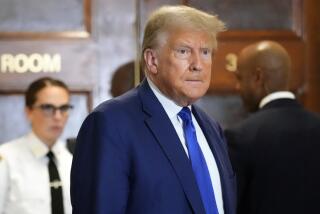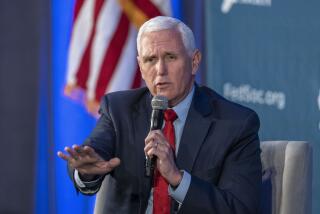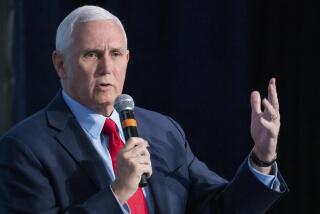Prosecution Closes Case Against North; Judge to Decide Today on Calling Reagan
WASHINGTON — Oliver L. North is on trial for his role in the Iran-Contra scandal, but, as the prosecution closed its case against him Thursday, all attention was on Ronald Reagan, his former commander-in-chief.
Today, culminating a week of legal maneuvering and speculation, U.S. District Judge Gerhard A. Gesell will decide whether to compel Reagan to testify against his will. The judge Thursday heard almost an hour of arguments from North’s lawyers, Reagan’s lawyer and the Justice Department.
North’s lawyers insist that Reagan’s testimony is crucial to their contention that North was acting under the direction of his superiors. The defendant, a retired Marine who served on the White House National Security Council staff, faces 12 felony counts centering on charges that he lied to Congress about his secret efforts to aid Nicaragua’s rebels and blocked investigations of his activities.
Fears Bad Precedent
Theodore B. Olson, Reagan’s attorney, contended that the former President is “interested in cooperating in any way he can.” At the same time, Olson told Gesell, Reagan does not want to set a bad precedent for future former presidents. No former President has ever taken the witness stand in a criminal trial, and Olson said that North’s lawyers have not shown why Reagan’s testimony is necessary.
The Justice Department also opposes requiring Reagan to testify. Its lawyers told Gesell that, on the witness stand, Reagan might be led to disclose national secrets. Preventing the questioning from drifting off into “other areas” besides the North case would be “difficult to control in the heat of a trial,” Stephen A. Saltzburg, a deputy assistant attorney general, said.
Saltzburg suggested that excerpts from Reagan’s diary might suffice. Former White House counsel A. B. Culvahouse Jr. “went through the diary” for relevant information, Saltzburg said.
Olson, on Reagan’s behalf, objected to using the diary, saying that it “reflects the personal thoughts” of the former President. Instead, he suggested, Culvahouse might be called to testify.
Attorneys discussed the possibility of videotaping Reagan, obtaining fresh written testimony or using written testimony that he gave to the prosecutors during the grand jury investigation of the Iran-Contra affair. Gesell said that he is not sure he has the power to release such material.
But Barry Simon, a North attorney, said that only a “live” appearance would do. He called Reagan “a material witness” whose testimony is needed to defend North against charges that he obstructed inquiries into the Iran-Contra scandal. The President, Simon noted, “set up that inquiry.”
“In this country,” Simon said, “a President is elected up from the masses, and, when his time is over, he goes back to the masses. We are talking about a person who is retired from public office.”
Gesell peered down at Simon and said: “I take it your position is President Reagan is just like anybody else” and therefore should be ordered to testify.
Simon agreed.
Earlier in Thursday’s court proceedings, John Richardson, chief of staff to Edwin Meese III when Meese was attorney general in 1986, testified as the prosecution’s 29th and final witness.
In November, 1986, Richardson said, the Justice Department was investigating secret U.S. arms sales to Iran. He said that he and Assistant Atty. Gen. William Bradford Reynolds were dispatched on Nov. 22 to search North’s office next door to the White House.
“We’d been there for some time,” he said, when “Brad sort of gave me a nudge under the table, handed me the document and pointed to one paragraph.”
The document was the memo in which North outlined the diversion scheme. The paragraph described sending to the Contras $12 million in “residual funds” from arms sales to Iran.
“I said something under my breath like, ‘Jeez, that can’t be,’ ” Richardson said. “Brad shrugged and put it back in the documents he was working on.”
More to Read
Sign up for Essential California
The most important California stories and recommendations in your inbox every morning.
You may occasionally receive promotional content from the Los Angeles Times.










